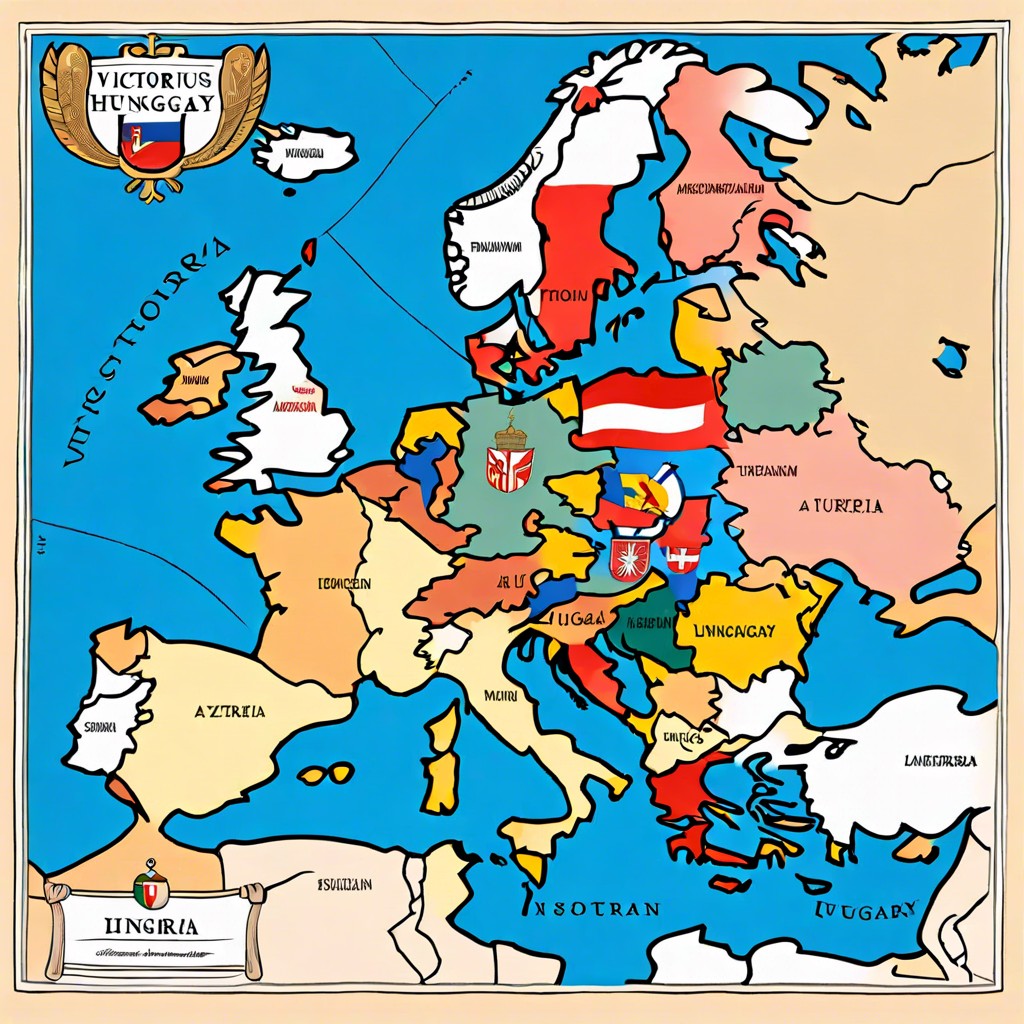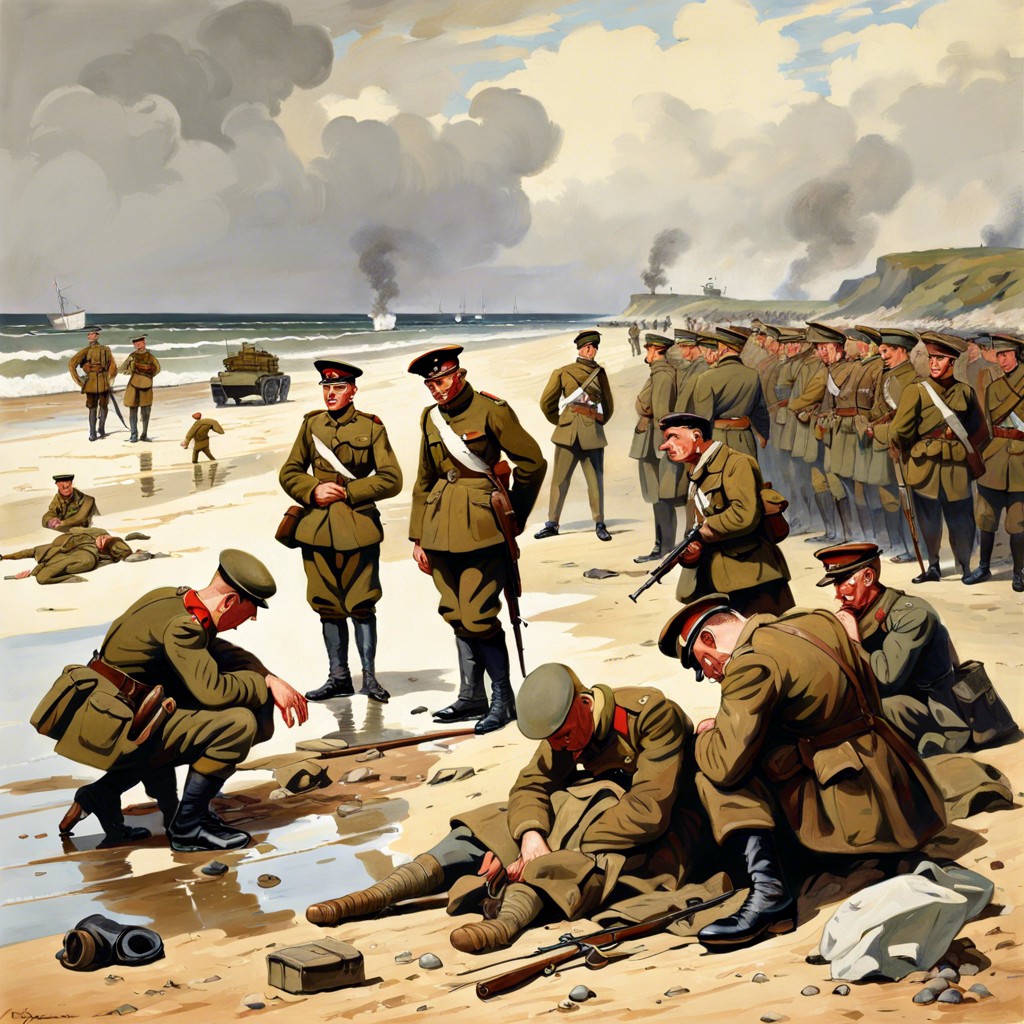Imagine a world where Austria-Hungary won WW1: how would Europe’s political landscape and cultural dynamics shift dramatically from what we know today?
Imagine a world where Vienna is the epicenter of a sprawling, victorious empire post-WWI, and Europe’s map looks like someone spilled ink on it. What if Austria-Hungary had won the Great War? Strap in as we delve into the labyrinth of newly drawn borders, shifting alliances, and budding tech wonders. Plus, we’ll tackle the ticking ethnic tensions and their potential global ripple effects, all served with a side of what-if sauce. Intrigued yet?
Key takeaways:
- Austria-Hungary’s win reshapes European borders drastically.
- Power dynamics shift, weakening France and Britain’s influence.
- Ethnic tensions escalate within a diverse empire.
- Colonial ambitions grow, sparking global competition.
- Technological and cultural advancements emerge from Vienna.
Territorial Changes and New Borders in Europe

Picture Europe as a jigsaw puzzle. Now imagine shaking that puzzle vigorously. If Austria-Hungary emerged victorious in WW1, they’d likely grab a few extra pieces.
First off, Serbia would probably get the short end of the stick. No Yugoslavia, just an expanded Austro-Hungarian playground. Oh, the irony.
Italy? Less pizza, more problems. They might lose some pieces of their pie to Austria-Hungary. Possibly the Julian March or South Tyrol. Awkward family dinners, for sure.
Poland and Ukraine? Complicated exes. Their borders would be redrawn in a way that makes a kindergarten crayon sketch look like a blueprint. Napoleon would laugh.
Remember Bosnia? Yeah, they’d just stay in the imperial soup, their own ethnic mishmash simmering away.
Invisible boundaries would become actual fences. Political maps: redesigned, republished, and probably resented. No more memes of “Austria-Hungary has entered the chat.”
The whole region would look like it came out of a blender, yet strangely—daringly—precise.
Shifts in Power Dynamics and Alliances
A victory for Austria-Hungary would have completely rewired Europe’s power structure. Picture a world where the Austro-Hungarian Empire is throwing its weight around, possibly stronger than it ever was. Germany wouldn’t be punished as harshly, potentially avoiding the dire economic woes that fueled future conflicts.
Forget the Versailles Treaty; we might see something like the “Austria-Hungary Super Happy Fun Agreement” (okay, maybe not that fun). Basically, the Allies wouldn’t have as much leverage. France and Britain, for instance, would lose their dominant post-war positions.
The balance of power would tilt significantly. Smaller European nations, who relied on the support of larger allies, would now have to reconsider their safety nets. Italy might rethink that whole betrayal thing. Serbia? Yikes, they’d need to stay super low-key.
Imagine Russia, post-Revolution, trying to navigate a Europe where Austria-Hungary is the big muscle. Not as easy to spread that Bolshevik revolution when the neighborhood’s guard dogs are robust.
And the U.S.? Might retreat back into that cozy isolationist shell a tad longer, as Europe’s new-old order stabilizes.
Ethnic and National Tensions Within the Empire
Imagine a mosaic so intricate, it makes a thousand-piece jigsaw puzzle look like child’s play. That was Austria-Hungary’s ethnic landscape. With a win in WW1, the empire would have had to juggle this delicate balancing act even more deftly.
First, think of the Slavs, ever the troublemakers (or freedom fighters, depending on your point of view). Their push for greater autonomy could escalate, much like a teenager demanding a later curfew.
Meanwhile, the Magyars in Hungary would likely clamp down, fearing their grip on power might slither away.
Don’t forget the Czechs and Slovaks. United in wanting to be less united with Austria-Hungary, they would probably ramp up their protests, channeling their inner revolutionaries.
And what of the Romanians? Straddling the line between loyalty and an ever-growing itch for independence, their stance would remain as firm as jello.
Basically, the empire would become an even more exhilarating rollercoaster. Hold on tight; things would get bumpy!
Impact On Global Colonial Ambitions
Oh, imagine the butterfly effect in the colonial race. Austria-Hungary, basking in victory, would likely crave a bigger slice of the global pie. With its eyes set on grabbing colonies, you’d see a mad scramble in Africa, Asia, and beyond. Because, why not? Who wouldn’t want a shiny, new colony or two, right?
They’d team up with other empires, shifting rivalries and making your favorite strategy board game scenarios even wilder. Picture bizarre alliances forming; Austria-Hungary and Italy high-fiving over a map of untapped resources, while Britain munches popcorn on the sidelines.
Remember, with power shifts come power struggles. Existing colonies would face new rulers with different quirks and policies. Some places might have thrived under different oversight—hello, alternate history novels! Others, probably less so. But boy, would it make for an interesting global chessboard.
Influence On Technological and Cultural Developments
One can only speculate how Austria-Hungary’s victory might have propelled technological and cultural innovations. Imagine an alternate world where Viennese engineers were front-runners in automotive advancements, rivaling Detroit. Ah, the Austro-Hungarian car—elegant yet quirky, much like a waltzing mechanical juggernaut.
In this reality, Vienna could have become a cultural hub akin to Paris, drawing artists, writers, and intellectuals from across the globe. Picture the blend of Hungarian paprika and Austrian pastries sparking a culinary revolution. Yum.
Tech innovation might have taken a unique path too. Instead of the Silicon Valley we know, maybe Budapest would’ve been the cradle of tech innovation, giving rise to quirky gadgets and gizmos that charm as much as they function.
Art movements could have shifted dramatically. Instead of Modernism dominating, we might see a rise in Art Nouveau, with its organic forms and intricate patterns, taking over the cultural landscape.
The impact on music? Mozart and Strauss could’ve paved the way for a new era of symphonies and operas, forever altering the soundscape of the 20th century. If only.




